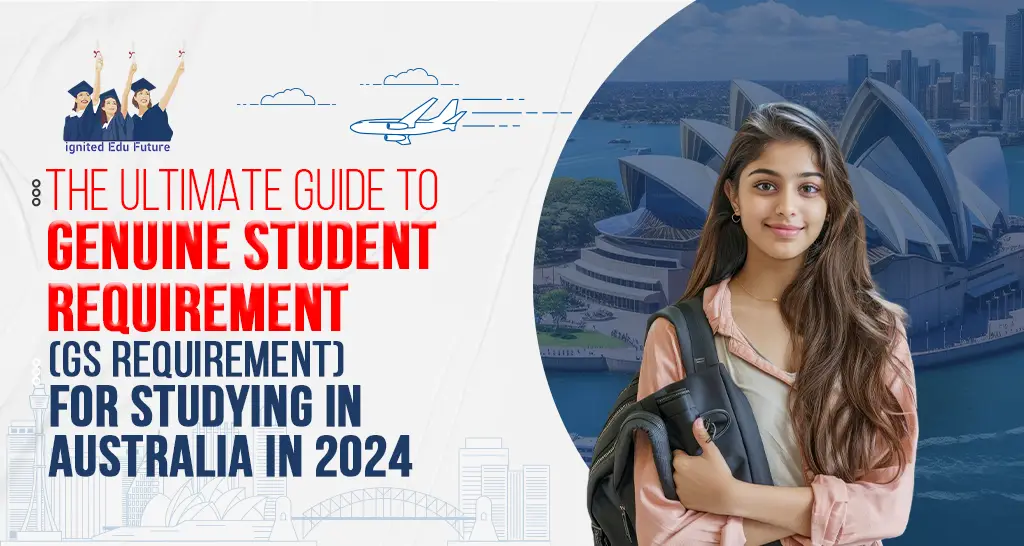Australia continues to be a sought-after destination for international students seeking high-quality education, vibrant multicultural experiences, and abundant opportunities for personal and professional growth. However, to study in Australia, students must meet certain requirements, including the Genuine Student Requirement (GSR). In this guide, we’ll delve into the intricacies of the GSR and provide valuable insights to help aspiring students navigate the process effectively and embark on their educational journey in Australia with confidence.
Table of contents
- Understanding the Genuine Student Requirement (GSR)
- Meeting the Academic Requirements
- Key Components of the GS Requirement:
- 1. Genuine Temporary Entrant (GTE) Criterion:
- 2. Genuine Intent to Study
- 3. Financial Capacity
- 4. Academic Qualifications:
- 5. Ties to Home Country
- 6. Seeking Scholarships and Financial Assistance
- 7. Seeking Professional Guidance
- 8. English Language Proficiency
- 9. Health and Character Checks
- Navigating the Application Process
- Meeting Post-Arrival Requirements
- Preparing for Academic Life in Australia
- Conclusion
Understanding the Genuine Student Requirement (GSR)
The Genuine Student Requirement (GSR) is a crucial aspect of the Australian student visa application process, designed to ensure that applicants genuinely intend to study in Australia and have the capacity to do so. As part of the GSR, applicants must demonstrate their genuine commitment to studying in Australia by providing evidence of their educational background, academic goals, financial capacity, and ties to their home country. This requirement is aimed at preventing visa fraud and safeguarding the integrity of Australia’s education system.

Meeting the Academic Requirements
To satisfy the GSR, applicants must demonstrate that they meet the academic requirements for their chosen course of study in Australia. This typically involves providing evidence of previous academic qualifications, such as transcripts, diplomas, or certificates, as well as meeting any specific entry requirements set by the educational institution. Additionally, applicants may need to demonstrate proficiency in the English language through recognized language tests such as the IELTS or TOEFL.
Key Components of the GS Requirement:
1. Genuine Temporary Entrant (GTE) Criterion:
The Genuine Temporary Entrant (GTE) criterion is perhaps the cornerstone of GS Requirements. It assesses whether an international student’s intention to study in Australia is genuine. Factors considered under the GTE criterion include the student’s personal circumstances, immigration history, and ties to their home country. Applicants must provide compelling evidence to demonstrate their genuine intent to study and return home after completing their studies.
2. Genuine Intent to Study
One of the key elements of the GSR is demonstrating genuine intent to study in Australia. Applicants must provide compelling reasons for choosing Australia as their study destination and articulate their academic and career goals. This may include explaining why they have chosen a particular course or institution, how it aligns with their career aspirations, and how they plan to contribute to their field of study upon graduation. Providing a well-thought-out statement of purpose can help applicants convey their genuine commitment to their educational journey in Australia.
3. Financial Capacity
In addition to academic qualifications, applicants must demonstrate their financial capacity to cover the cost of their studies and living expenses in Australia. This includes tuition fees, accommodation, healthcare, and other day-to-day expenses. Applicants may be required to provide evidence of sufficient funds, such as bank statements, scholarship awards, or financial guarantees from sponsors. Adequate financial planning is essential to ensure that students can support themselves financially throughout their stay in Australia.
4. Academic Qualifications
International students must possess the necessary academic qualifications to enroll in their chosen course of study in Australia. This may include academic transcripts, certificates, or diplomas from previous educational institutions. It’s essential to ensure that these qualifications meet the standards specified by Australian universities and educational authorities.
5. Ties to Home Country
As part of the GSR assessment, applicants must demonstrate strong ties to their home country to prove that they are genuine temporary entrants to Australia. This may include evidence of family, employment, property ownership, or other significant commitments that indicate their intention to return to their home country after completing their studies. Demonstrating strong ties to their home country helps reassure Australian immigration authorities that applicants are not intending to overstay their visa or engage in unauthorized work or activities in Australia.
6. Seeking Scholarships and Financial Assistance
For international students seeking financial assistance to study in Australia, scholarships and grants can be invaluable resources. Many Australian universities and government organizations offer a range of scholarships specifically designed for international students, covering tuition fees, living expenses, and other study-related costs. Applicants are encouraged to explore scholarship opportunities early in their application process and submit their applications well in advance to maximize their chances of success.
7. Seeking Professional Guidance
Navigating the Genuine Student Requirement (GSR) and the Australian student visa application process can be complex and daunting for many international students. Seeking guidance and support from reputable education consultants or migration agents can greatly simplify the process and increase the likelihood of a successful outcome. Experienced consultants can provide personalized advice, assist with document preparation, and help students navigate any challenges or obstacles they may encounter along the way.
8. English Language Proficiency
Proficiency in the English language is vital for academic success in Australia. Most universities and colleges require international students to provide evidence of their English language proficiency through recognized tests such as the IELTS, TOEFL, or PTE Academic. Meeting the minimum English language requirements is a non-negotiable aspect of GS Requirements.
9. Health and Character Checks
As part of the visa application process, international students are required to undergo health examinations to ensure they meet Australia’s health requirements. Additionally, applicants must demonstrate good character by providing police clearance certificates from countries where they have resided for extended periods.
Navigating the Application Process
Fulfilling the Genuine Student Requirement is an integral part of the visa application process for studying in Australia. Prospective students must adhere to the following steps to ensure a smooth application experience:
- Research and Choose a Suitable Course and Institution: Conduct thorough research to identify the most suitable course and educational institution based on your academic goals, career aspirations, and personal preferences.
- Check Eligibility Requirements: Review the eligibility criteria for the selected course and institution to ensure that you meet the academic and English language proficiency requirements.
- Prepare Required Documents: Gather all necessary documents, including academic transcripts, English language test scores, proof of financial capacity, health insurance details, and a valid passport.
- Submit Online Application: Complete the online application form for the chosen course and institution, providing accurate and up-to-date information as required.
- Pay Application Fees: Pay any applicable application fees for processing your application. Ensure you hold the proof of payment for future reference.
- Attend Interview (if required): Some courses or institutions may require applicants to attend an interview as part of the selection process. Prepare adequately and demonstrate your genuine interest and suitability for the course during the interview.
- Await Visa Decision: After submitting your application, await a decision on your student visa application from the Australian Department of Home Affairs. This process may take several weeks, so it’s essential to apply well in advance of your intended start date.
Meeting Post-Arrival Requirements
Upon receiving a student visa and arriving in Australia, international students must continue to fulfill certain obligations to maintain compliance with the Genuine Student Requirement:
- Attend Classes Regularly: Actively participate in all scheduled classes and academic activities as required by your course curriculum.
- Maintain Satisfactory Academic Progress: Ensure that you meet the academic requirements of your course and make satisfactory progress towards completing your studies.
- Comply with Visa Conditions: Adhere to all conditions specified in your student visa, including restrictions on working hours, duration of stay, and any other relevant requirements.
- Keep Documents Updated: Keep your passport, visa, health insurance, and other essential documents valid and up-to-date throughout your stay in Australia.
- Seek Support if Needed: If you encounter any difficulties or require assistance during your time in Australia, don’t hesitate to reach out to the support services provided by your educational institution or relevant authorities.
Preparing for Academic Life in Australia
Congratulations on securing admission to your chosen university in Australia! As you prepare to embark on this exciting educational journey, here are some tips to help you adjust to academic life in Australia:
- Orientation Programs: Attend orientation programs organized by your university to familiarize yourself with campus facilities, academic services, student support resources, and social activities. This will help you integrate into the university community and make new friends.
- Time Management: Develop effective time management skills to balance your academic studies, extracurricular activities, part-time work (if applicable), and personal commitments. Create a timely study schedule and prioritize tasks to stay well organized.
Conclusion
In conclusion, the Genuine Student Requirement (GSR) is a fundamental aspect of the Australian student visa application process, designed to ensure that international students genuinely intend to study in Australia and have the capacity to do so. By understanding the requirements of the GSR and diligently preparing the necessary documentation, aspiring students can enhance their chances of obtaining a student visa and pursuing their educational goals in Australia. With careful planning, genuine intent, and professional guidance, studying in Australia can be a rewarding and transformative experience for international students in 2024 and beyond.
Read More Insightful Articles:
- Success Starts Here: Top Study in USA Consultants in Chennai for International Education
- Best Abroad Consultancy Services in Chennai for 2024
- The Ultimate Guide to IELTS Coaching in Chennai
- Why Do Students Choose Engineering in the UK?
- The Complete Guide to Studying in Ireland: All the Information You Need
- Reasons Why Studying in Ireland Will Change Your Life


